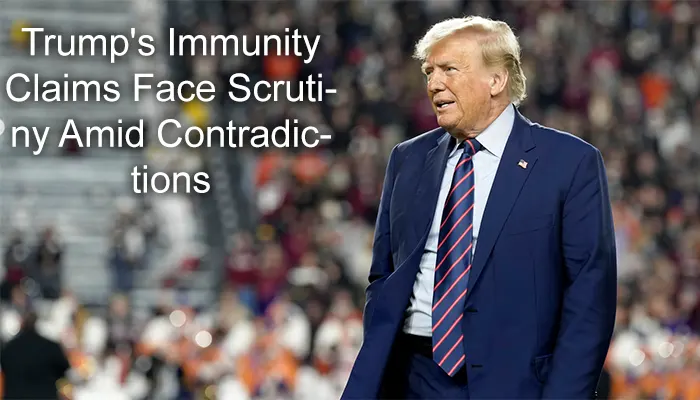Trump’s Immunity Claims Face Scrutiny Amid Contradictions
Entitlement to Immunity – Trump’s Assertion
In a recent social media post, former President Donald Trump reiterated his claim to immunity, asserting that as the President of the United States and Commander-in-Chief, he was entitled to such protection. Trump argued that every president, especially one who did the job as successfully as he did, deserves immunity.
Contradictions in Trump’s Statements
However, a closer examination of his statements and legal maneuvers reveals a significant contradiction that could impact the heart of his immunity appeal. Trump’s repeated insistence that the 2020 election was “long over” when he pressured then-Vice President Mike Pence and various state officials to overturn its results forms a crucial aspect of his argument for immunity.
Inconsistencies with Trump’s Previous Statements
Yet, this stance faces a critical challenge. Trump himself, in November 2020, declared that the year was “a long way from over.” This stark contrast raises questions about the consistency of his claims and presents a hurdle for his legal team. Additionally, a brief submitted to the Supreme Court by attorney John Eastman, a Trump ally, asserted that Trump sought intervention in his “personal capacity as a candidate for re-election,” adding another layer of complexity to the immunity argument.
Legal Experts’ Insights
Legal experts weigh in, highlighting the importance of distinguishing between Trump’s actions as president and those as a candidate. The Supreme Court and the D.C. Circuit may ultimately decide whether the alleged criminal acts were conducted within the scope of his official duties, thus warranting immunity.
Impact on Credibility and Trial Prospects
Tim, a legal expert, emphasized the significance of this distinction, emphasizing that Trump’s evolving positions may hurt his credibility and chances for immunity. The court will need to determine whether Trump’s actions, particularly his efforts to investigate nonexistent voter fraud, were undertaken as part of his official responsibilities or as a private citizen seeking reelection.
Judicial Disinclination and Pivotal Issues
As Trump continues to assert his entitlement to immunity, legal analysts predict that the inconsistency in his arguments may pose challenges in both the appellate courts and a potential trial. The question of whether Trump was acting in the best interests of the country or pursuing personal goals could be a pivotal factor in the court’s final decision.
Ongoing Debate and Potential Legal Implications
In light of recent oral arguments, where three judges seemed disinclined to adopt Trump’s immunity claims, legal experts suggest that the emphasis on Trump acting in his official capacity in 2020 may not be sufficient to secure immunity. The debate on whether conspiring to overturn election results is acceptable, regardless of the role – president or candidate – remains a persistent and pivotal issue in this legal saga.
Conclusion and Future Ramifications
As the appeals process unfolds, Trump’s legal team faces the challenge of reconciling his contradictory statements and securing immunity in the face of mounting scrutiny from the courts. The resolution of this case may have far-reaching implications for the understanding of presidential immunity and the legal consequences of actions taken by a sitting president or a candidate for reelection.


